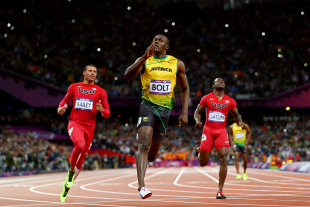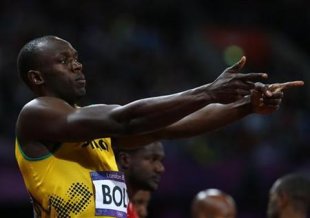Usain Bolt's legend grows after he breaks Olympic record in epic 100-meter final
LONDON – It was past midnight here, long after Usain Bolt electrified the Olympics again, having emerged from a slow start to not merely defeat but also break the will of the fastest group of humans ever assembled en route to another gold in the 100 meters.
He sat in a jammed news conference, talking about how the reality of losing in the Jamaican trials had awoken him. He talked about how a confidence borne from his own greatness had made him calm no matter how often he lumbered from starting blocks not built for his 6-foot-5-inch frame. He talked about how the energy from 80,000-plus onlookers left him in the optimum mood to run: calm, relaxed, and ready. He talked about how he'd eaten McDonald's before the race. "Don't judge me," he said.
And then Usain Bolt was asked how desperately he wanted to be known, now and forever, as a legend.
"Do I really need to answer that question?" he sa He already had. Over 9.63 blistering seconds in a heavily hyped race packed with challengers desperate to unseat him, Usain Bolt answered whatever ridiculous doubts existed about his drive for greatness.
Jamaica's Yohan Blake finished second at 9.75. America's Justin Gatlin was third at 9.79. Neither Blake nor Gatlin ever ran faster than they did Sunday. This was the second- and third-fastest men on Earth running as well as they ever have.
And neither stood a legitimate chance against the Lightning Bolt.
Legend? There is no other word.
"I went out to challenge a mountain," Gatlin said later. "To challenge the odds."
Fellow American Tyson Gay, who finished fourth at 9.80 and then wept and wept at the realization he wasn't even close, was more direct.
"I tried, man," Gay said, spent and emotional. "I tried my best."
Legend? This is legend.
This is a giant among children, a man who doesn't just run past his peers but leaves them in a huddled mess. His rivals don't wonder what if. They marvel at what happened. There were no second-guesses here, not even among the uber-confident set that made up the 100-meter final.
"Best man won," Gatlin said. "And that was Bolt."
They all came to London thinking the champ was vulnerable. Bolt had some injuries. He claimed he was just 95 percent fit. Blake had even beaten him straight up in Jamaica's nationals.
And suddenly, seven challengers were left in the dust, some stumbling across the finish line wondering how they could run so fast and never come close to catching the man in lane seven.
"I just ran," Bolt explained. "Pretty much."
Pretty much?
Legend? Who else says pretty much?
Bolt believed enough in himself to write off the first 30 meters. He's slow at the start. The other sprinters are 5-8, maybe 5-10. They spring out of the blocks with grace and ease and hit full throttle early. Bolt stumbles a bit because he's too large for the attempt. On Sunday he didn't even start at the precise moment.
"I think I sat in the block a little," he explained on BBC. "I don't think I had the best reaction in the world."
He had the best philosophy. His coach drilled a simple maxim into him, one that would explain away those weak starts with the promise of the furious finale.
"Stop worrying about the start, the best part of the race is the end," Bolt explained.
Legend? Who other than a legend doesn't worry about the start, the first third or half of a race this short?
He is tall and powerful, like no other sprinter the world has ever seen. His stride allows him to take fewer steps, which means he doesn't have to move his legs as fast as the others. His strength means he doesn't just glide down the track – his legs power him forward, allowing him to attain a velocity that simply doesn't appear possible in a smaller frame.
So after 30 meters – even 50 – as long as he is even remotely close, the race is over.
"I got to 50 meters and I knew," he said.
Maybe the others didn't. Maybe they still saw daylight in front of them, no green and yellow blur moving away from them as they flew – absolutely flew like no group of humans has ever flown. Maybe they thought glory was upon them, or at least possible.
It wasn't. Here came Bolt like everyone else was standing still. He burst into first. He burst into open air. He burst into a spot where no one and nothing could get him, flying into history.
Bolt thought about turning and celebrating before he crossed the line, like he did in Beijing, humbling his challengers. He decided against it. Then he thought about beating his 9.58 world record. "It was too late," he admitted.
And, really, that's the difference between Usain Bolt and the others, between the fastest people on Earth and a legend you can't invent.
All these ultra-talented, peak-performance star sprinters churned with all their might and all their will and all their training, and Usain Bolt was trying to decide which dramatic way he wanted to drive the stake through their hearts.
Taunt them a little bit? Set a world record? Settle for only beating his own Olympic mark, grabbing a flag, and saving a bit of energy for the 200-meter event still to come?
"How important is it to be a legend?" the legend was asked.
Like he hadn't already explained


No comments:
Post a Comment